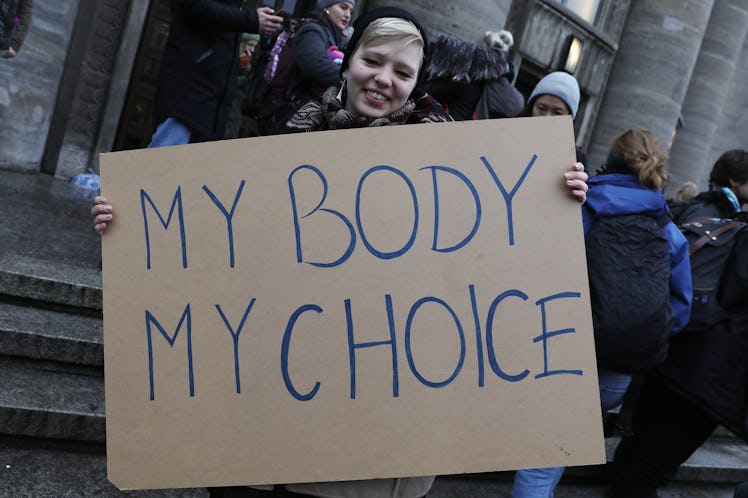
Here's What To Know About The New Abortion Laws In Virginia & New York, So Stay Informed
Let's be real, it's never been more important to stay up to date on the issues impacting our country at the moment. Even though it feels like there's a new controversy every day, here's another one to add to the list. In recent weeks, two states have introduced new abortion laws that could mean serious changes for reproductive rights. So, what are the new abortion laws in New York and Virginia? Here's what to know.
In the midst of concern that Roe v. Wade, the 1973 Supreme Court decision that legalized abortion nationally, could be overturned thanks to a conservative majority on the Supreme Court, some states are moving to secure abortion rights at the state level. In recent weeks, two states, Virginia and New York, have introduced laws to ensure abortion rights to people within their borders, but they're causing some controversy.
In Virginia, House Bill 2491 would remove abortion restrictions such as the 24-hour waiting period, which requires women to wait a full day and undergo counseling before having an abortion, and a mandate that requires women in their second-trimester to have abortions in a hospital. In addition, the bill would change the current law in Virginia which requires people in seeking an abortion during their third trimester of pregnancy to be evaluated by three doctors to confirm that the pregnancy is life-threatening before an abortion is permitted. With House Bill 2491, only one doctor would be required to do the evaluation and terminating the pregnancy would be allowed if the mother's "mental or physical health is threatened," per Vox. The bill was introduced in the Virginia House on Jan. 9.
Meanwhile, in New York, legislators passed The Reproductive Health Act on Tuesday, Jan. 22, allowing patients seeking abortions to be assisted by physicians without political interference. The act, which was signed into law by Gov. Andrew Cuomo on Jan. 23, does several things, including removing abortion from the state's criminal code and moving it into the realm of public health, as well as legalizing abortions after 24 weeks if the mother's life is in danger or the fetus is not viable. In addition, the new law allows nurse practitioners and physician’s assistants to provide abortion care, which was formerly restricted to doctors.
While the bills are in different states and at different stages of becoming law (or are law), they've both raised some controversy among pro-life groups and anti abortion activists. Some opponents of these new legal measures have claimed that the laws will give pregnant individuals the right to receive abortions up to the time of birth. While that may be true if a doctor allows it, the reality is that it's very unlikely — abortions late in pregnancy rarely occur unless there's a serious threat to the woman's life, or the fetus has medical issues.
According to reproductive rights organization Planned Parenthood, only 1.4 percent of abortions occur at or beyond 21 weeks of the women's pregnancy. Dr. Anuj Khattar, a Fellow with Physicians for Reproductive Health, stresses in an interview with Elite Daily on Feb. 4 that many women who have abortions later in pregnancy do so because consequential information concerning the fetus' health and fetal genetics isn't available until later in the pregnancy.
"[The] majority of procedures do occur before 26 weeks, and it's rare that procedures happen later in pregnancy," Khattar says. "And that's because it takes time to develop some of these diagnoses that impact the fetus. Most women don't have information or data regarding their pregnancy in that regards until later."
These new laws may have caused a stir, but they're important for a number of reasons, such as making sure continuing a pregnancy to term is up to the mother's choice, and not a third party. "It's not a politician's job or my job to force the decision to continue a pregnancy to term for a pregnancy that might not even be viable," Khattar says. "It's cruel to women and puts them at increased risk."
Andrea Miller, President of the National Institute for Reproductive Health, told Elite Daily in a press call that the bills are being misrepresented, and that voters are in fact pressing for better legislation around reproductive rights.
"The important point is that there's an attempt to misrepresent, there's a cynical ploy happening in order to score political points," Miller told Elite Daily during the press call. "Voters are clear in many states that we need to be turning the direction of this country around toward reproductive freedom, toward trusting women and not in the direction that the Trump administration wants to take it."
Controversy aside, Khattar sees the laws as a progressive move towards reproductive rights. "I hope it sets a stage for other people to follow and show that we can live in a fact based and health based society and meet the needs of women," Khattar says.
No matter where you stand on these issues, it's always important to stay informed. So before you judge, make sure you have all your bases covered.